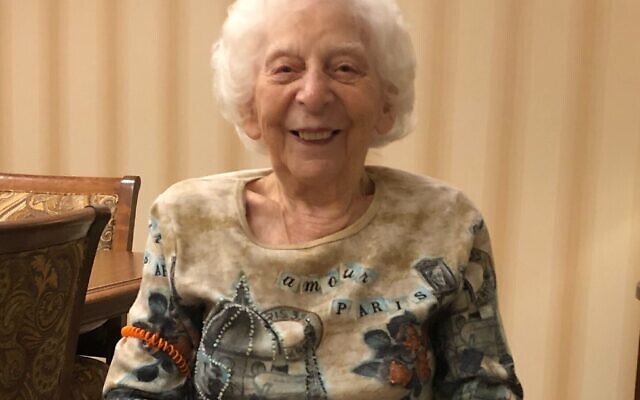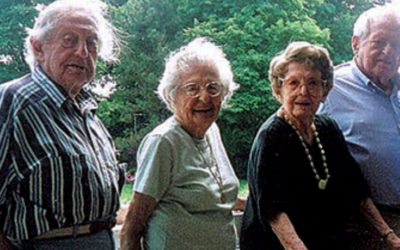Do Jews Live Longer?
Research among Ashkenazic Jews has led to some important breakthroughs in how we understand the genetics of aging.

Next month when Frieda Banks blows out the candles on her birthday cake, she probably won’t have much left she can wish for. At the age of 101, she’s had a long, happy, and generally healthy life. She’s still physically active, doesn’t need glasses, a hearing aid or a nursing aide to get her through the day.
She plays cards three or four times a week, enjoys being with others and smiles easily. Aside from some difficulty with her short-term memory, she easily recalls the high points in her long life and the lives of her four children, seven grandchildren and eight great-grandchildren.
The power chair she uses when she leaves her apartment at Sunrise at Huntcliff Summit in Sandy Springs is one of her few concessions to advancing age. If anything, she has less patience than ever for those who complain about their aches and pains.

“I don’t like to hear all my friends talking about what’s wrong with them. I don’t do it and I’m older than all of them.”
Banks is what gerontologists like to call SuperAgers, people who are still enjoying life after their 100th birthday and have little or no experience with the life-threatening illnesses than afflict their contemporaries.
The term was coined by Dr. Nir Barzilai, an Israeli-born physician who summarized over 20 years of research about how and why we age, in a new book published last year, “Age Later: Health Span, Life Span, and the New Science of Longevity.”
Much of that research comes from his Longevity Genes Project at Yeshiva University’s Albert Einstein College of Medicine in New York City which has followed over 750 Ashkenazic Jews there between the ages of 95 and 109. They all reached their advanced age without having had such life-threatening illnesses as heart disease or cancer.
He chose these Ashkenazim not just because he found them to be especially long-lived but because they generally resemble one another more closely genetically than other ethnic groups.
Their genetic makeup, he believes, has been shaped by centuries of politically imposed isolation in Eastern Europe and by religious beliefs that led to marriages with Jews of a similar background.
However, when researchers looked more closely at their lifestyle, they found these Jews to have some very bad habits. Over half of them were obese or overweight, many didn’t exercise, and over half of them smoked. One New Yorker, Helen Kahn, who lived to be almost 110, smoked regularly for 90 of those years. Her brother Irving, a wealthy financial consultant who was also in the study, lived to be 109, but gave up smoking years before he died.
So Dr. Barzalai was forced to look elsewhere for his answers to what leads to a longer life.
He described what he found in “Age Later,” his first book on his research. What he learned credits longevity, primarily, to good genes.

“Despite all the external factors that might figure into longevity —- the factors that the SuperAgers have control over and often do take control over —- they believe that genes are the biggest determinant of life span. And of course, I agree,” he wrote in the book.
And so, it seems, would Banks, who remembers her mother who died at the age of 88. She was a forceful and energetic woman who lived independently and refused to allow any outside help into her home until she died, Banks said of her mother.
And she mentions that Banks’ oldest son, at 80, is a doctor, who still is actively involved in his busy practice at the three offices he runs in Chattanooga, Tenn.
Banks offers one final example of the extraordinary energy that runs in her family. She is a swimmer and, at the age of 98, she saved a struggling and much younger woman from drowning by pulling her through the water to safety.
What all the research on Jews may lead to is some important medical breakthroughs.
Barzilai, among other scientists, wrote in his book that he believes that he and his colleagues may one day soon be able to start to control, through the science of genetics, some of the important factors that cause aging. He predicts in his book that in the future, more people will enjoy the benefits of the SuperAgers, whatever the genes we were born with.
Among the world’s leading experts on the topic, Felipe Sierra is in charge of the research into the biology of longevity at the National Institute on Aging. He described the “major pillars of aging” in a 2015 article in Science. In this publication of the American Association for the Advancement of Science, Sierra summarized what he mentioned as the half dozen pathways and mechanisms that lead to aging more quickly.
Because of what they have learned, scientists believe we may be close to realizing the previously impossible notion that we can control aging. Or as Sierra maintains, once researchers more fully understand the genetics of aging, there’s a good chance we will be able to control it.



comments